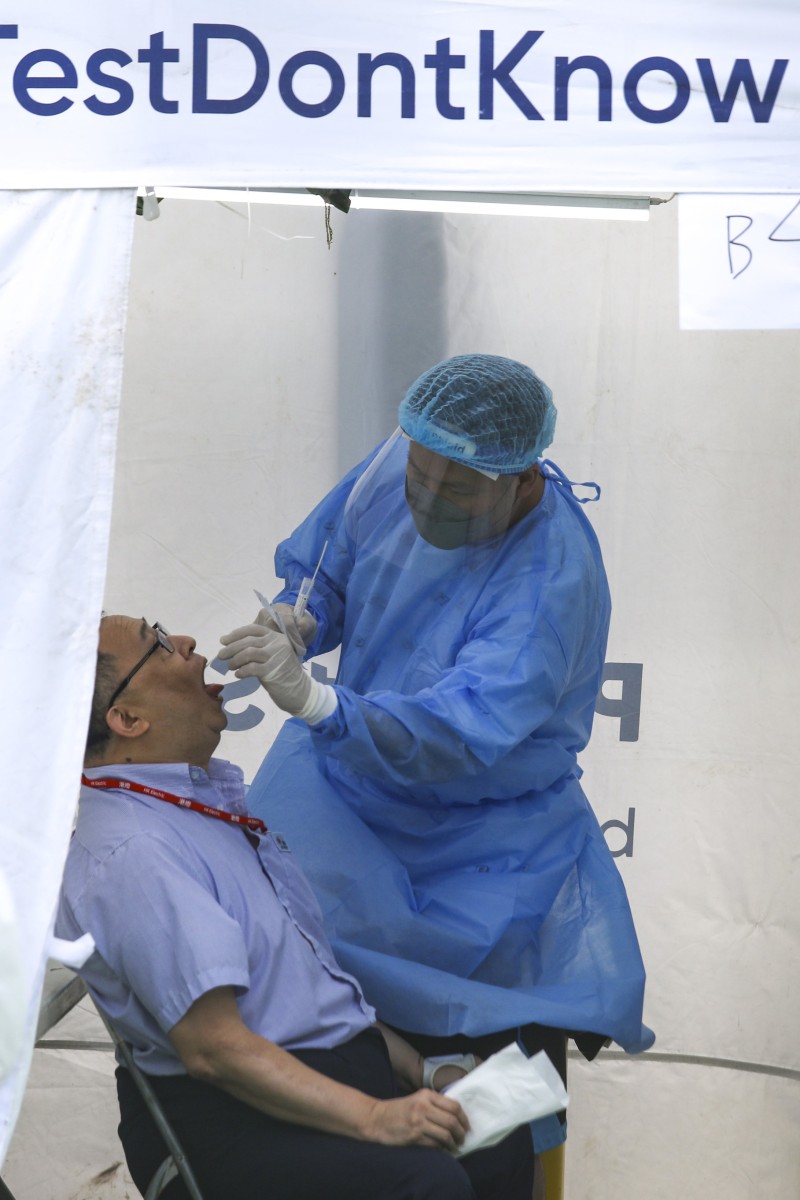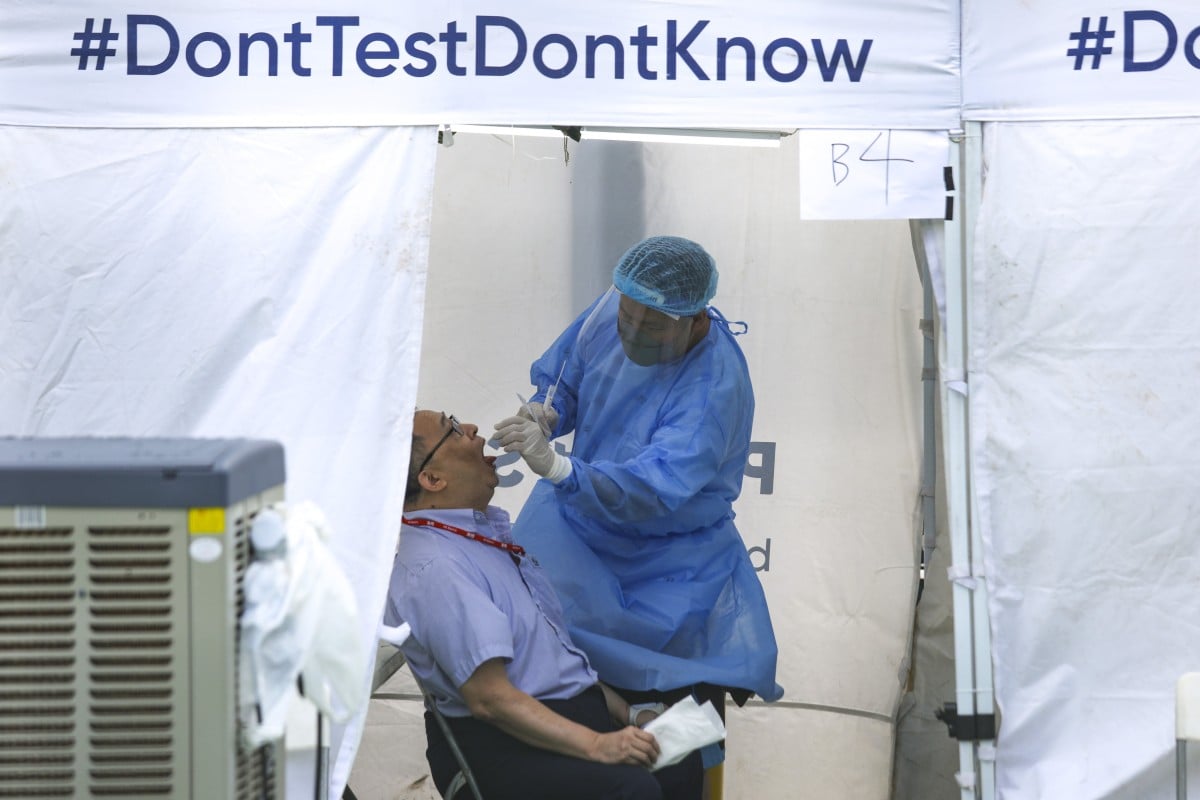
- Researchers at Chinese University urge government to establish designated clinics to provide early treatment for those experiencing long Covid
- Study by CUHK has interviewed almost 7,000 respondents so far, with plans to reach 10,000
 Symptoms of long Covid can include hair loss, mood disorders, as well as a persistent cough or shortness of breath. Photo: Xiaomei Chen
Symptoms of long Covid can include hair loss, mood disorders, as well as a persistent cough or shortness of breath. Photo: Xiaomei ChenAn ongoing study has found that more than 2 million Hongkongers may have experienced symptoms of long Covid, with 70 per cent of interviewees reporting conditions such as depression, poor memory and hair loss.
The Chinese University of Hong Kong (CUHK) researchers behind the study, which involved 6,994 respondents and was released on Sunday, urged authorities to establish designated clinics to provide early treatment for those with the condition to prevent further pressure on the city’s healthcare system, noting some cases lasted for up to two years.
Professor Francis Chan Ka-leung, the dean of CUHK’s medical faculty and the director of the Centre for Gut Microbiota Research, said 70 per cent of respondents in the study, which was conducted between July and October, had experienced at least one persistent symptom of long Covid, a condition that could last for more than four weeks after recovery from the initial infection.
“Around 30 per cent of [the respondents] had received two or three doses of the vaccine. Their symptoms are mostly short-term and mild. But the symptoms of the rest of them, 70 per cent of them, are continuous,” he said.
“Some of them have been suffering from the symptoms since the fourth wave of the pandemic for two years.”
As part of the ongoing research effort supported by the Hospital Authority, which started in July, staff at CUHK aimed to interview at least 10,000 people of varying ages using a bilingual online survey, Chan said.
Based on the study’s results so far, the medical faculty dean estimated that around 2 million people in Hong Kong could have experienced varying degrees of long Covid if the number of infections since the pandemic began was some 3 million.
A total of 1,837,848 coronavirus infections had been reported to the authorities since the pandemic began, along with 10,273 related fatalities. But health officials and scholars have said the figures had not taken into account unreported infections or asymptomatic patients, potentially pushing the total to 3 million.
Among the respondents who were experiencing long Covid, 40 per cent reported poor memory and more than 30 per cent said they had mood disorders such as insomnia, anxiety and depression. Meanwhile, more than 20 per cent suffered from persistent coughing, shortness of breath, sore muscles and hair loss, and 40 per cent told researchers they were suffering from more than one symptom.
Another 20 per cent said they once had long Covid and had recovered from it.
Two-fifths of adult respondents who had or recovered from the condition said it affected their work performance, while the same proportion of youngsters interviewed said they experienced similar issues at school.
Citing previous studies from CUHK, Chan said long Covid was also associated with an imbalance of bacteria existing in a person’s gut, with the condition potentially causing a shortage of “good” ones and an abundance of “bad” organisms.
“We realised that the severity and duration of Covid-19 symptoms are unrelated to long Covid,” he said.
“Many people told me that their test results turned negative two to three days after testing positive and they only had a runny nose during the Covid-19 infection. But they were seriously affected by long Covid.”
Calling for the creation of designated clinics to treat the condition, Chan said family doctors could help those with milder symptoms by prescribing pills to improve gut health or arranging a gut bacteria transplant for more severe cases.
“I hope that if there are millions of Hong Kong residents being impacted by [long Covid], they could seek help as early as possible to avoid them turning into persistent, or more complicated issues,” he said, adding that family doctors should be trained to tackle the condition to prevent patients from having to see a number of specialists.
Primary schools can resume full-day classes in Hong Kong if 70 per cent of students double-jabbed
“The patients may need to get cough drops from respiratory specialists and at the same time ask for a referral to psychiatric departments for other problems,” he said. “It does not help with the situation and even increases the medical burden.”
In a reply to the SCMP, the Hospital Authority (HA) said it would actively follow up with those who recovered from Covid-19, adding that it would review the need for specialised services in a timely manner based on the patients’ recovery and demand.
The spokesman added that Chinese medicine clinics run by the HA, non-governmental organisations and local universities in 18 districts also offered rehabilitation services for patients.